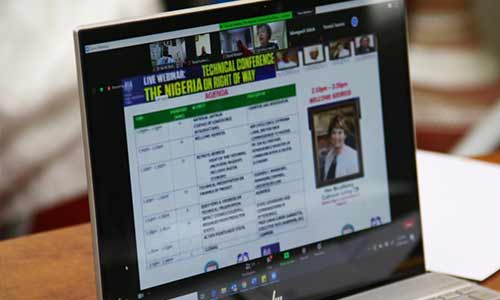The British Government through its Prosperity Fund’s Digital Access Programme, has taken the next step in its pledge to support and promote inclusive and sustainable digital access to unserved and underserved communities in Nigeria.
In collaboration with the Federal Ministry of Communications and Digital Economy and the Nigerian Communications Commission (NCC), the Digital Access Programme yesterday hosted the first Nigeria Technical Conference on the Right of Way (RoW) to further aggregate views from key stakeholders, towards the advancement of policy and regulatory reforms on Right of Way (RoW) and Issuance of Planning permits for Mast and Towers.
The virtual forum is one of the key deliverables of the UK’s Technical Assistance project on RoW, which was initiated in April 2020 to assess the existing strategy, charging regime and measure that against economic development indicators.
Funded and overseen by the Digital Access Programme, Greenfields Law, a leading telecom policy, law and regulation firm in Nigeria had engaged with key stakeholders and proposed effective solutions based on the evidence gathered, while taking into account international best practice.
Delivering the opening remarks, the British High Commissioner to Nigeria, Catriona Laing commended the Minister of Communications and Digital Economy and said:
“Nigeria has seen great progress in the effort to provide inclusive digital access to millions of its citizens. The COVID19 pandemic has however, made the world rely more heavily on internet connectivity for access to basic necessities – health, education, work, shopping, convenience and other services. As such, substantial digital inequities have been revealed.
“The UK is keen to support the promotion of affordable, inclusive, safe and secure digital access for underserved or excluded populations, and this conference is a significant step to discuss the technical findings of our preliminary study, outcomes, lingering challenges and the way forward.
“I hope that today’s deliberation will culminate into an increased digital inclusion as a basis for a more thriving local tech ecosystem, generating skilled jobs and innovative solutions for local development challenges.”
Hon. Minister of Communications and Digital Economy, Dr. Isah Ali Ibrahim (Pantami) gave the keynote address and said:
“I want to thank the UK Government for supporting the Nigeria Digital Economy agenda. Earlier the UK Government supported us in the development of the new national broadband plan through the Digital Access Programme.
“Nigeria has in the last 1 year of my time as Minister, added 10% to the broadband penetration level in the country. RoW reforms is the key to unlocking Nigeria’s digital economy for inclusive digital growth and we have worked with the Nigerian Governors Forum to achieve some important results already. We will continue to champion this reforms on RoW and work on the challenges identified by the technical study.”
Reacting to the technical study and the next steps on, the Executive Vice Chairman of the Nigeria Communications Commission, Prof Umar Garba Danbatta, represented by the Executive Commissioner Stakeholder Management (ECSM), Mr. Adeleke Adewolu also thanked the UK Government’s Digital Access Programme for their support in championing reforms on RoW to deepen digital inclusion in Nigeria.
“The Technical Assistance on RoW reforms will assist in our quest for deepening broadband penetration in Nigeria. NCC is willing and ready to advance the reforms noted in the technical study and will collaborate with stakeholders to effect it in the short, medium and long term.” He added.
Applauding State Governments that have announced the reforms on RoW, the UK Government’s Digital Access Programme Adviser and Country Lead, Idongesit Udoh, said:
“This project will help accelerate the roll-out of backbone connectivity infrastructure, to underserved communities which is the key to unlocking Nigeria’s digital economy for inclusive, digitally-enabled growth, development and job creation for Nigerians.
“The Digital Access Programme is also working on other projects such as cybersecurity essentials upskilling for SMEs around the country and basic digital literacy to promote inclusive economic growth and development.”





